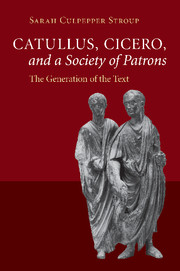Book contents
- Frontmatter
- Contents
- Preface and acknowledgments
- List of abbreviations
- Introduction
- I HOW TO WRITE ABOUT WRITING
- II THE TEXTUALIZATION OF DISPLAY
- 4 The problem with liberal performance
- 5 From public display to textual display
- 6 The poetics of literary obligation
- III THE MATERIALIZATION OF THE TEXT
- Epilogue
- Appendix: What “Society of Patrons”? A prosopography of the players
- Bibliography
- Index locorum
- Index rerum et nominum
4 - The problem with liberal performance
Published online by Cambridge University Press: 04 August 2010
- Frontmatter
- Contents
- Preface and acknowledgments
- List of abbreviations
- Introduction
- I HOW TO WRITE ABOUT WRITING
- II THE TEXTUALIZATION OF DISPLAY
- 4 The problem with liberal performance
- 5 From public display to textual display
- 6 The poetics of literary obligation
- III THE MATERIALIZATION OF THE TEXT
- Epilogue
- Appendix: What “Society of Patrons”? A prosopography of the players
- Bibliography
- Index locorum
- Index rerum et nominum
Summary
“THE GAZE CRAMPS MY FREEDOM”
By the final years of an increasingly display-driven Roman Republic, forensic oratory was the only profession of ritualized and secular public display that was both suitable for the privileged classes and fixed within the system of liberal-political and civic hierarchy. As both Edwards and Barton have argued, active participation in theatrical and gladiatorial display – the “pleasure industries” of both the Republic and subsequent years – was in this period confined almost exclusively to foreigners and the lower social strata. These types of display were illiberal by definition and operated at a social, geographical and ideological remove from the discourse of the privileged classes. Members of the cultural elite were allowed to patronize or produce these performances; but they were discouraged from becoming part of a performance itself. They could attend the theater, but only as viewers and not, strictly speaking, as the viewed. There was a problem with liberal performance in the late Republic – this problem is the focus of the following section – whereby the patronal classes were driven to engage in the forms of public display around which the Republic was built, but they did so at the risk of making the status that allowed this display vulnerable to critique or derogation.
- Type
- Chapter
- Information
- Catullus, Cicero, and a Society of PatronsThe Generation of the Text, pp. 117 - 140Publisher: Cambridge University PressPrint publication year: 2010



